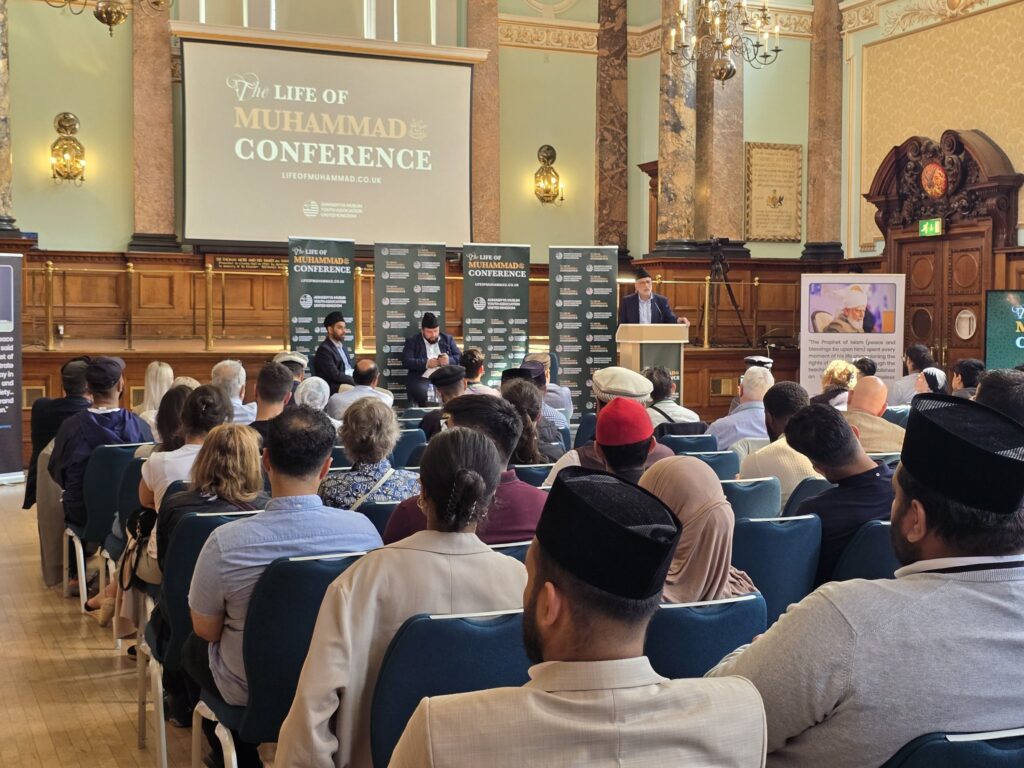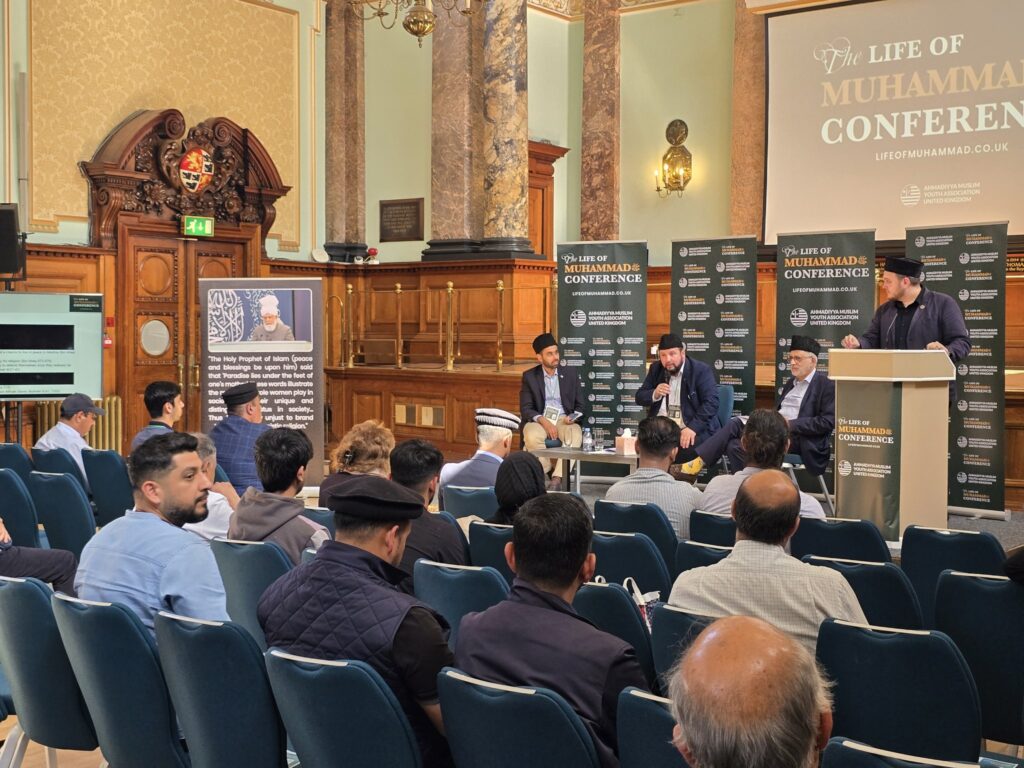
On Saturday, 14 June 2025, Majlis Khuddam-ul-Ahmadiyya UK held the “Life of Muhammad Conference” at Chelsea Old Town Hall in London. The event aimed to bring together people from all walks of life – academics, faith leaders and members of the public alike – to reflect on the life and teachings of the Holy Prophet Muhammadsa.
Following the recitation and translation of the Holy Quran, the guests were formally welcomed and the purpose of the event was introduced: to highlight the relevance of Prophet Muhammad’ssa teachings in today’s world – not through preaching, but by learning about his life and character.
As a role model, every aspect of his life serves as a lesson for us all: his tolerance, his compassion for the poor, his bravery and courage in the face of persecution, his promotion of justice and his empowerment of women, to name a few. These aspects would be highlighted and elaborated upon in the course of the conference. The Ahmadiyya Muslim Community was also briefly introduced.
Human rights, justice and freedom of belief
The keynote address was delivered virtually by Professor Heiner Bielefeldt, a German academic and former UN Special Rapporteur on Freedom of Religion or Belief. Speaking from a human rights perspective, he thanked the Ahmadiyya Muslim Community for its contribution to the global struggle for religious freedom. He cited two examples which he personally found significant: the role of Sir Muhammad Zafrulla Khanra, Pakistan’s first Foreign Minister and an Ahmadi Muslim, in shaping the 1948 Universal Declaration of Human Rights, and a 2011 European Court case which protected the right of Ahmadi asylum seekers to practise their faith openly.
Professor Bielefeldt expressed that during his time in the UN, he came across many cases of Ahmadi Muslims persecuted in several countries, such as Pakistan, Bangladesh and Indonesia. They were forced to either hide their faith or face punishment. The Ahmadiyya Muslim Community, he said, has paid a high price for religious freedom and, despite the heavy price, continues to lead in defending it.
The most influential person in history
A short video made by The Review of Religions was shown to the audience, in which the general public in London was asked to guess the most influential man to have ever lived. Gandhi, Einstein and Bill Gates were among the guesses, but the correct answer was Prophet Muhammadsa, according to Michael Hart’s book The 100: A Ranking of the Most Influential Persons in History. The reactions were a mixture of shock, excitement and eagerness to learn more.
Charter of Medina and the roots of pluralism
A special message was then shared by Dr Boumédiène Benyahia, who reflected on the Prophet Muhammad’ssa migration to Medina and the historic Charter of Medina he established, which is often cited as one of the first written constitutions in the world. He explained that Prophet Muhammadsa established a pluralistic society by uniting the immigrants and natives (muhajirun and ansar), and that the Charter of Medina laid the foundations for peaceful coexistence, equality and the protection of religious freedom – values that remain under threat today.
Justice as a universal principle
Dr Zahid Khan, President of the Ahmadiyya Muslim Board of Arbitration, then delivered a talk on Prophet Muhammad’ssa role as an arbiter of justice. Quoting from the Holy Quran (Surah an-Nisa, Ch.4: V.136), he highlighted the Islamic principle of bearing witness to truth even against one’s own self or kin. “This is the golden standard of justice,” he explained, which is expected at every level of human interaction. Citing the words of Hazrat Khalifatul Masih Vaa, he said that without justice, there can be no peace. In the current troubled state of the world, how true are these words?
Zahid Khan sahib also spoke on the Holy Prophet’ssa experiences of persecution and his consistent commitment to justice and peace. Despite facing relentless abuse, exile and war, he forgave and united his people. The Charter of Medina, which the Holy Prophetsa established, predates the Magna Carta and American Constitution by centuries, and embodied universal values of dignity and equality. The world can learn much from the life of the Holy Prophetsa and the teachings of Islam, should people choose to take heed.
Panel Q&A discussion

The programme concluded with a panel Q&A with Dr Zahid Khan Sahib, Abdul Quddus Arif Sahib and Ibrahim Ikhlaf Sahib. Members of the audience raised questions on various topics, including the misuse of religion for violence by some, the punishment for blasphemy in Islam (i.e. depicting the Holy Prophetsa or writing inflammatory speech against him), the killing of Jews belonging to the Banu Qurayzah tribe, and the blueprint for lasting interfaith relations and harmony.
One academic, who is currently writing a book on prejudice, remarked that the majority of conflict stems not from religion but from power, land and jealousy. Religion being a source of violence is a common misunderstanding, which the panellists took time to dispel and clarify.
President of the Ahmadiyya Muslim Youth Association, Abdul Quddus Arif Sahib, explained how from the very inception of the idea of the conference, Hazrat Khalifatul Masih Vaa took keen interest in the planning phase. Huzooraa instructed that great attention to detail be upheld, including choosing a suitable name for the conference and ensuring the venue was appropriate and dignified. Huzooraa also selected the Jamaat speaker himself, and highlighted that the conference was just as important for Jamaat members as it was for external guests, hence they too should be encouraged to attend. It is with Huzoor’saa prayers, Quddus Sahib mentioned, that the event was a success, with many esteemed academics in attendance, as well a great turnout of the general public too.
All in all, the event was a success, as it brought together people of diverse backgrounds to remember the Holy Prophet Muhammad’ssa legacy – not just as a religious leader, but as a true role model in every aspect of life.

